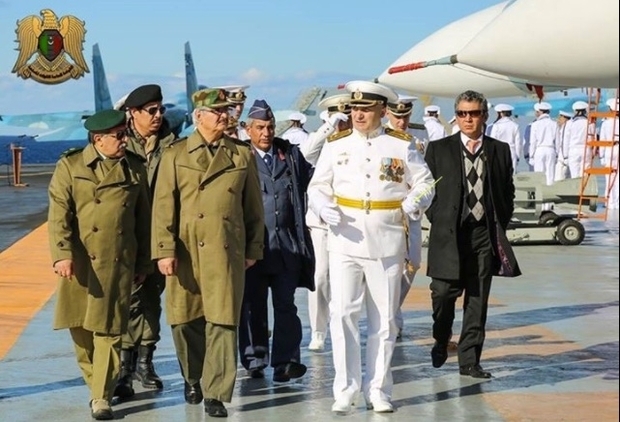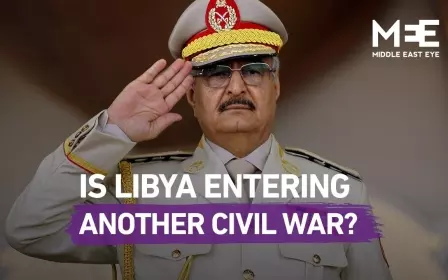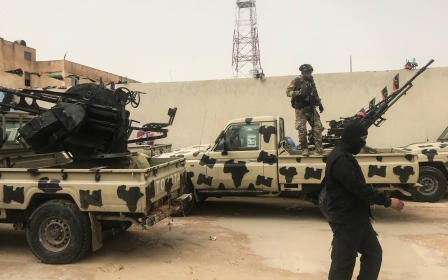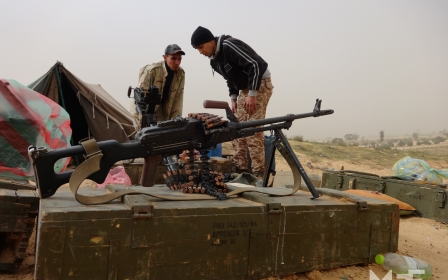World leaders call on Haftar to 'halt' his troop advance to Tripoli

International leaders and rights groups have called for troops loyal to Khalifa Haftar's Libyan National Army (LNA) to end its military advance on Tripoli as fighting escalates near the capital city.
Italian Foreign Minister Enzo Milanesi called on Haftar to listen to warnings made by international leaders.
Speaking after a G7 meeting of foreign ministers in Western France on Saturday, Milanesi said: "We have stated quite clearly what our position is."
"We very much hope that he will take it into consideration. If this does not happen, we will see what can be done," he added.
Other ministers from the G7 also urged for an immediate halt to "all military activity and movements towards Tripoli", warning that civilians were in danger.
New MEE newsletter: Jerusalem Dispatch
Sign up to get the latest insights and analysis on Israel-Palestine, alongside Turkey Unpacked and other MEE newsletters
The G7's calls echoed previous calls made by the UN Security Council on Friday, who called on Haftar to "halt all military movements" as fears mounted over further instability in the country.
The appeal for Haftar to halt his offensive was unanimously backed by the council, including Russia, which has supported the general.
UN envoy Ghassan Salame told the council that Haftar made clear during a meeting with UN Secretary-General Antonio Guterres that he had no intention to halt its advance to Tripoli.
Salame made his statement as Guterres left Libya on Friday after coming to the country to help organise elections.
Human Rights Watch meanwhile called on all warring sides on Saturday to remain calm and to minimise "civilian harm".
"All forces taking part in fighting around Libya’s capital, Tripoli, should take all necessary action to minimise civilian harm and abide by the laws of war," Human Rights Watch said.
"Armed groups loyal to both sides have a record of abusing civilians."
Migrants in Libyan detention centres
Dozens of migrants locked up indefinitely in detention centres across northern Libya also told reporters they fear they may be forced to fight against Haftar's forces.
Migrants stuck in the detention centres after being returned to Libya by EU-backed Libyan militias said that they were forced to load weapons for local forces fighting Haftar.
"We loaded weapons, and later we will load again. Some soldiers left with the weapons and some are here with us," a migrant stuck in the detention centre told the Irish Times.
"If we tell them to take us back to our room they will not accept it. There are many types of weapons, e.g. RPG, big green rockets, bombs...there are some weapons that I don't know their names. And there are cars with big guns."
A spokesman for Haftar's LNA said that the militia had taken control of the former Tripoli International Airport on the southern outskirts of the capital.
Ahmed Mismari told reporters on Friday that his forces were in control of Tarhouna and Aziziya, two towns near Tripoli, Reuters reported.
He said five of his troops had been killed without going into further detail, the news agency said.
Earlier on Friday, Haftar's fighters were pushed back from a key checkpoint less than 30km from Tripoli, checking their advance on the capital, security and military sources said.
Pro-government militia fighters from the coastal town of Zawiya, west of Tripoli, retook the base in Janzour after a "short exchange of fire", the security source told the AFP news agency on condition of anonymity.
Armed clashes also broke out on Friday south of Tripoli between a pro-government alliance and Haftar's forces, sources on both sides said.
A unity government source told AFP the fighting occurred in regions less than 50km south of the capital.
Middle East Eye delivers independent and unrivalled coverage and analysis of the Middle East, North Africa and beyond. To learn more about republishing this content and the associated fees, please fill out this form. More about MEE can be found here.




